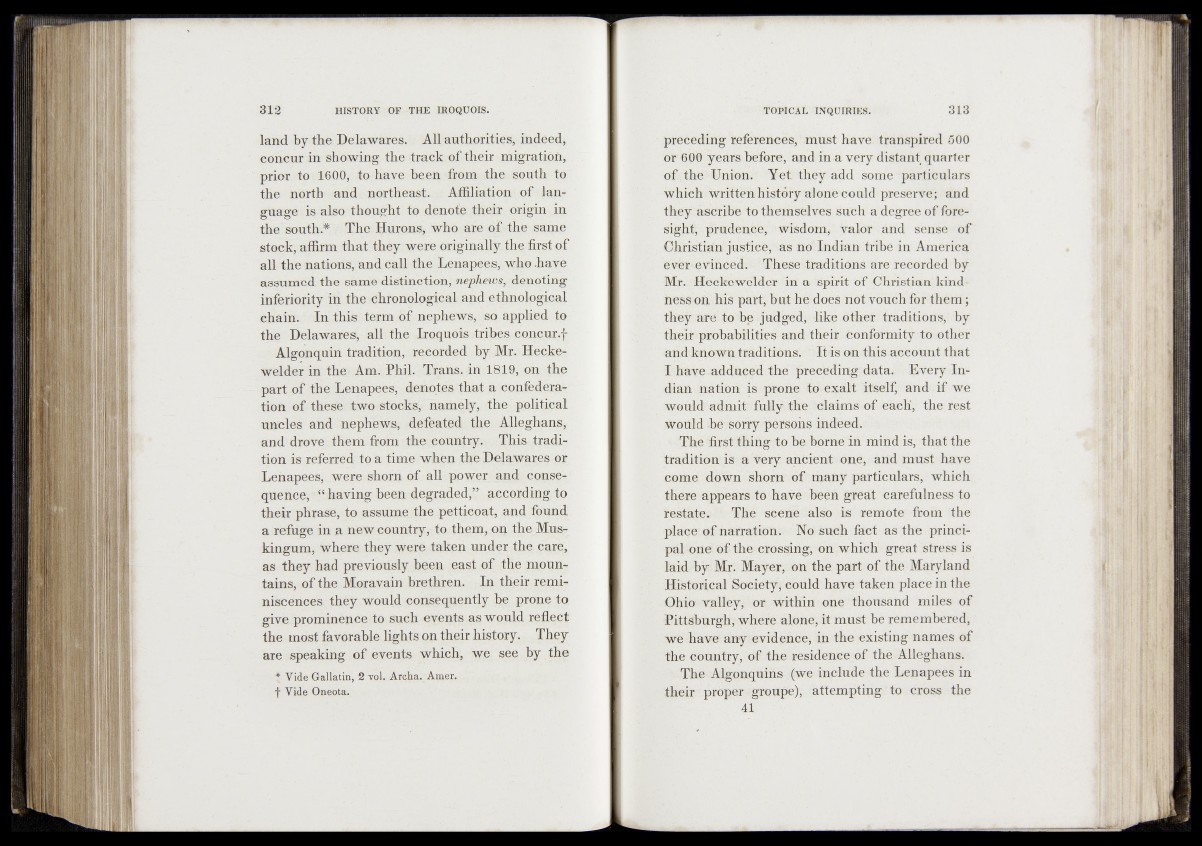
land by the Delawares. All authorities, indeed,
concur in showing the-track-of their migratioh,
prior to 1600, to have been from the,south to
the north and northeast. Affiliation-..of lan-
g ill^ ^ '^ is^ h o u g h t to denote their origin in
the south.* 1 The Hurons, who .age of the same
stock, affirm that they were originally the first of
all the nations, and call the Lenapeesy who have
assumed the same distinction, nephems, denoting
inferiority in the chronological and ethnological
chain. In this term of nephews, sQ applied to
the Delawares, all the Iroquois .tribes concur.f
Algonquin tradition, recorded by Mr. Hecke-
welder in the- Am. Phil. Trans,-in 1^19, on the
part of the Lenapees; denotes that q confederation
of these two stocks,- namely, the political
uncles and nephews, .defeated the Alleghans,
and drove them from thecountry. j This tradition
is referred to a time when the Dekwqres or
Lenapees, _were shorn of all p.o^er and epnse-?
quence, U£ having been degraded,” according to
their phrase, to assume .the petticoat, and found
a refuge in a new country* to them, oq the Muskingum,
where they were taken under the care,
as they had previously, .been east ©f the mountains,
of the Moravain brethren. In $£ir reminiscences
they would consequently be prone to
give prominence to such events as would reflect
the most favorable lights on their history . They
are speaking of events which, we see by the
% Vide Gallatin, 2 vol. Archa.;Ataer.
f Vide Oneota.
preceding references, must have transpired 500
or 600 years before, and in a very distant quarter
of ; the*TJnion." Yet they add some particulars
which written history aloud could preserve; and
they ascribe to themselves, such a degree of foresight,
prudence," wisdom* valor and sense of
Christian justice,, as no' Indian tribe in America
ever bYinced. These traditions are recorded by
Mr. Hecke welder in a spirit of Christian kindness
oil his part* but he does not vouch for them ;
they are to be judged, like other traditions, by
their probabilities and their conformity to other
and'knowntraditions. It is on this account that
I have addueed the preceding data. Every Indian
nation is prone to exalt itself, and if we
would admit" fully the claims of each*, the rest
would he* sorty persoils indeed.
The "first thing to he borne in mind is, that the
tradition is a very ancient one, and must have
come down shorn of many particulars, whidh
there appears to have been great carefulness to
testate. The scene also is remote from the
place of narration; Ko sueh fact âs the principal
oile of the crossing, on which great stress is
laid, by Mr- Mayer, on the part of the Maryland
Historical Society; could' have taken place in the
Ohio valley, or within one thousand miles of
Pittsburgh, Where alone, it must be remembered,
we have any evidence, in the existing names of
the country, of the residence of the Alleghans.
The Algonquins (we include the Lenapees in
their proper groupe), attempting to cross the
4 1